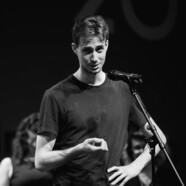PQ Talks will address various forms of performance design and scenography in a range of cultural, political, historical and technological contexts, using three formats: Discussion Panels and Roundtables, Flash Talks, and Keynote presentations. Keynote speakers will appear on the stage of the Jatka78 theatre as follows:
- 9 June - Asiimwe Deborah Kawe
- 10 June - Dušan David Pařízek
- 11 June - Katrin Brack
- 14 June - Julian Maynard Smith
- 15 June - Oksana Sarzhevska-Kravchenko, Mykhailo Glubokyi (IZOLYATSIA)
The curator of PQ Talks, theatre historian Barbora Příhodová, says of the programme: “The rich 10-day program is composed of selected proposals by artists and researchers from more than 50 countries. For this edition, we have made a deliberate effort to recognize the scenographic practices and contributions from the Global South.”
As an example, PQ Talks will host several panels about performance design in Latin America and feature voices of indigenous artists from Canada, Brazil, Nigeria, and New Zealand. In line with this, Asiimwe Deborah Kawe has been invited to give a keynote presentation about her work at the Kampala International Theatre Festival in Uganda, one of the most exciting theatre festivals in Africa.
In addition, leading cultural figures from Ukraine, Oksana Sarzhevska-Kravchenko and Mykhailo Glubokyi are coming to introduce the cultural institution IZOLYATSIA, founded in 2010 in a former insulation factory in Donetsk, Ukraine. In 2014, their premises were taken over by Russian forces and turned into a prison: a place of illegal detention, horrific torture and executions. Over the past decade, IZOLYATSIA has become a symbol of the resilience of the Ukrainian cultural sector and continues to promote democratic values based on the belief that cultural institutions are the pillars of a free democratic society. Through the story of the IZOLYATSIA collective, the audience will learn how the Ukrainian cultural sector is responding to Russian aggression and the role and place of art and culture during the war in Ukraine.
With the support of the Goethe-Institut, PQ will host a renowned German scenographer Katrin Brack with her talk All That Is There. Brack will elaborate on why her stage designs do not think about whether they are art, about how she comes up with her ideas, which part the text or the actors play in them and how everything existing out there is included in her stage designs, whether spaces, trades, theatres, the people there or even the audience. About how to keep meanings in flux and create a maelstrom of the unexpected.
“We want to have a collective discussion about shifts in scenographic practices and discourses in the context of multiple global crises. Our intention is to reflect on the possible artistic paths into the future,” adds Barbora Příhodová.
One of the highlights of PQ Talks will be a day dedicated to Ecoscenography Conversations. These discussions will be led by two major experts in the field, Tanja Beer and Marianne Lavoie, and will include perspectives from artists, researchers, educators, and students who are pushing towards sustainability in performance design.
The programme of the Prague Quadrennial can be found on the website PQ.cz. One-, three- and eleven-day Festival Passes are available on the GoOut.net platform.
Prague Quadrennial of Performance Design and Space
Since 1967, once every four years, PQ explores the artistic areas of scenography, performance design and space within all their aspects - from scenic art, costume, lighting and sound design, and performance space architecture to side-adaptive performance, applied scenography or costume as a performance. The core of the festival’s idea is to present contemporary performance design as a self-sufficient art form, acting upon the human imagination through all the senses - sight, smell, hearing, touch and taste. PQ traditionally hosts artists from more than a hundred countries and is the most important event of its kind in the world.
Performance design/scenography has evolved substantially and expanded far beyond established theatre conventions. Models, sketches of designs, and performance photographs still remain excellent resources that map the minds and open the door to the imagination of their creators. On the other hand, these formats capture only one part of the creative process and tell us little about the environment, circumstances, emotions, and overall atmosphere of the performance. The one way to present scenography in its genuine form, comprising all of its parts and including audience participation, is to experience it live, in performative settings and curatorial environments that create or recreate its operations.
The present-day practice of performance design/scenography is one of the most exciting art forms and creative domains – in the innovative, fresh and holistic ways of engaging their audiences, participants, and the public.
In 2015 Prague Quadrennial received the EFFE award and was named one of the most innovative festivals in Europe.
Prague Quadrennial is initiated by the Ministry of Culture of the Czech Republic
and organized by the Arts and Theatre Institute.
With the supprt of: Prague 7 City District
In cooperation with: the Holešovice Market, National Gallery Prague, the Theatre Faculty of the Academy of Performing Arts in Prague, Czech Centers, Art&Digital Lab - H40, Máš umělecké střevo?
Partners: Volkswagen Czech Republic, Mama Shelter Prague
Main media partner: Czech Radio








